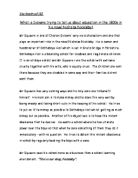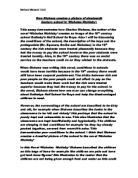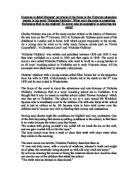Dickens also presents Squeers as a parsimonious and tight-fisted character. An example of this is when Squeers is giving five of his boys their breakfast. He buys only half a jug puff milk and tells the waiter just fill the rest of the jug ‘...with lukewarm water...’ This demonstrates that Squeers is all too happy to be overly efficient when it comes to other people’s welfare.
Mr Squeers’ behaviour towards the children is also very brutal, far beyond what would be considered reasonable even by those in favour of corporal punishment. A good illustration of this is when Squeers sees the warts on Bolder’s, (one of the students) hands he canes the boy, and without stopping ‘...until his arm was tired out.’
He also seems to revel at the idea of punishing others, for example when he says ‘...leave of chattering your teeth and shaking with the cold, I’ll warm you with a severe thrashing...’ This illustrates Squeers as a very unsympathetic character in many ways. It shows that he cares little if at all about the fact that the boy is chattering his teeth because of the cold and that he is an easily irritated character. He is also a character that the reader can easily hate and wish misfortune on of only just to save the boys in his ‘care’.
Dickens also portrays Squeers as a greedy character, At the mention of the possibility of six boys being enrolled in his ‘school’, he immediately puts great amounts of energy into trying to rope them in. ‘...those six boys... for twenty guineas a year...’ presents Squeers as a character who just wants more and more, never happy with what he has already got but just keeps wanting more. This creates even more sympathy from the reader towards the boys as the reader knows that Squeers will continuously rope in more and more victims for his gain.
When we are first told about Dotheboys Hall in the newspaper advert, the first thing the reader notices is the strange name which gives us a strange foreboding about the place before we even know anything about it. After reading the rest of the advert, it sounds like it could be a potentially nice place. ‘…at the delightful village…’ Use of such positive adjectives makes it sound not all that bad.
When we actually see Dotheboys Hall, any positive opinions we may have had of it are quickly replaced by thoughts of a very unattractive looking mess. As Squeers says, ‘It ain’t really a hall…we call it that in London to make it sound better.’ This shows that the so called hall is overstated in every way so that when seen for the first time, everything about it is a disappointment. This then makes the reader wonder how many more disappointments there are going to be. This could also be a hint as to how life at that time was for many children, a constant run of disappointments.
Almost as important as Squeers in Dickens’ mission to inform the reader is Mrs Squeers. When Nicolas asks for only a small piece of pie, she replies ‘...pity to cut the pie if you’re not hungry...’ this shows her that she has similar traits to her husband in that she is unwilling to give people more than the bare minimum required.
The relationship between Squeers and his wife however, is very different to their relationship with others. For example when Mrs Squeers asks her husband if he would like any ale, she means ‘whether Nicolas should have ale, and not whether he (Squeers) would take any.’ By Squeers understanding this from only a subtle wink from his wife shows that they have a very good, strong relationship and understand each other well. This being a strong contrast to how they communicate with others, particularly the children.
The way Dickens presents the children as being so weak and vulnerable is yet another of the key ways in which Dickens convinces us that the way they are treated is unfair and wrong. An example of this is when they are described in the shop as ‘children with the countenances of old men, deformities with irons upon their limbs...’ this shows that these children have all been ruined beyond repair by the all the awful treatment they have received. This makes the reader feel ever more sympathetic towards the children and all the while more disconcerted as to how children may be treated in the real world.
The last but certainly not least character I am going to explore that is used by Dickens to attain sympathy is Smike. This character was originally one of the students at Dotheboys Hall but the payments then stopped coming and so Squeers kept him as a slave. When we see Smike for the second time is when we get a real impression about how sad his life has been. When Nicolas looks at him what he sees is a look that was ‘...a very painful one...for it told a long and very sad history.’ This shows that there is no limit as to how low a child’s welfare can drop in all things positive as Smike has dropped from being a over punished pupil, to a cruelly treated slave. The readers reaction to this is clearly one of compassion for the character, and then for children in similar situations in real life.
To conclude, this book quite possibly has an important historical context as to how the lives of children have changed in Britain since that time. There is a good chance it may have changed the opinions of many of its readers and informed those who were unaware and opened the eyes of the people who were turning a blind one. The fact that it could have had such affect on the matter of the treatment of children makes it clear to me that Dickens wrote this book far more as a message to the people, than just as a source of monetary gain.







